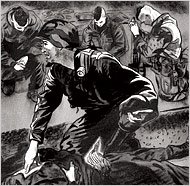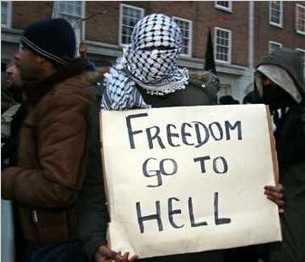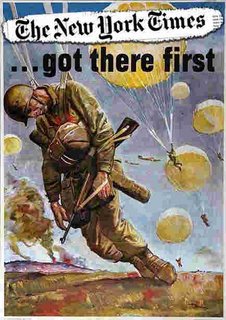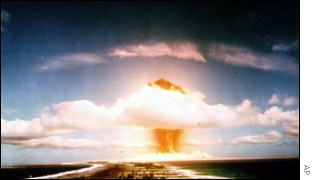How Bad Are Things, Really?
We all know that despite news reports of massacre and carnage, the civilian death toll in Iraq has gone down considerably since the war to remove Saddam Hussein began back in March 2003.
Here are more figures on how the Iraq War stacks up historically:
The recorded Iraqi civilian fatalities (including insurgents, military, morgue counts, police, etc.) were down 16% (16% maximum) in 2005... 38% (48% maximum) less than 2003 (via Leftist anti-war site Iraq Body Count). If you take out the numbers from that horrible day in August 2005 when nearly one thousand panicked Iraqis were trampled or drowned near a Muslim shrine, the year shows striking progress compared to 2003 and 2004 with fatalities one third less than in 2004...
This shows how Iraq War Casualties compares to other American Wars:(2,471 Iraq War Fatalities as of 5/31/2006)
John Hinderaker at Powerline adds this:
A total of 2,471 servicemembers have died in Iraq from 2003 to the present, a period of a little over three years. That total is almost exactly one third of the number of military personnel who died on active duty from 1980 to 1982, a comparable time period when no wars were being fought. Until very recently, our armed forces lost servicemen at a greater rate than we have experienced in Iraq, due solely to accidental death.
Do you recall that during the 1970s, 1980s and 1990s there was any suggestion, from anyone, that our military policies were somehow disastrous due to fatalities among our servicemen--fatalities that nearly always exceeded those we are now experiencing in Iraq? No, neither do I.
To further put things in perspective, Newsmax reported yesterday that...
Iraq Is Less Violent than Washington, D.C.
Despite media coverage purporting to show that escalating violence in Iraq has the country spiraling out of control, civilian death statistics complied by Rep. Steve King, R-IA, indicate that Iraq actually has a lower civilian violent death rate than Washington, D.C.
Appearing with Westwood One radio host Monica Crowley on Saturday, King said that the incessantly negative coverage of the Iraq war prompted him to research the actual death numbers.
"I began to ask myself the question, if you were a civilian in Iraq, how could you tolerate that level of violence," he said. "What really is the level of violence?"
Using Pentagon statistics cross-checked with independent research, King said he came up with an annualized Iraqi civilian death rate of 27.51 per 100,000.
While that number sounds high - astonishingly, the Iowa Republican discovered that it's significantly lower than a number of major American cities, including the nation's capital.
"It's 45 violent deaths per 100,000 in Washington, D.C.," King told Crowley.
Other American cities with higher violent civilian death rates than Iraq include:
Detroit - 41.8 per 100,000
Baltimore - 37.7 per 100,000
Something to think about when you read the next "Iraq the quagmire" headline!
Still, wars are not won or lost and nations are not built based on body counts. Free societies fight wars to defend, uphold, and improve. We must not forget that those who did die gave their lives in a noble cause. Only time will tell if it's a successful one.
Meanwhile, Belmont Club reminds us that Iraq is still a failing state--just one of many--and that failing states offer a unique challenge to the remaining legacy nations states around the globe:
Iraq, Afghanistan, Sri Lanka, East Timor. Four states currently in the headlines the most worrying thing about which -- apart from that each has a Western presence which may continue for years -- is that they may be joined by other countries jolted into collapse by any unpredictable crisis. A huge natural disaster, epidemic or internal conflict could precipitate many of the countries referred to as "failed states" into complete collapse. For two successive years (2005, 2006) Foreign Policy has listed the 'most failed' states based on twelve indicators which attempt to measure the degree to which each has broken down...
Leo Tolstoy wrote that "all happy families resemble one another, but each unhappy family is unhappy in its own way." The Foreign Policy list of 'most failed' states for 2006 (hardly changed for 2005) suggests that Tolstoy's observation applies to countries as well. North America, Western Europe and Japan are functionally similar but each failing state fails in its own way. Some failing states, like Haiti, have no natural wealth, while Iraq and the Congo sit on a fortune in mineral riches. Many are technologically backward but two -- Pakistan and North Korea -- are nuclear or near-nuclear powers. Some, like Iraq, Afghanistan, Somalia, Pakistan, Yemen, Uzbekistan, Kyrgyzstan and the Sudan are part of Islam's "bloody borders". Others, like North Korea and Cuba (number 62) are Cold War relics which somehow escaped the extinction of socialist states, but for how long no one knows.
If the failing states and their manifestations (conventional and WMD terrorism, prohibited drugs, massive illegal immigrations, gigantic humanitarian crises) are going to be a persistent, long-term problem then the natural response would be to create a capability to meet the challenge. In outline any mechanism capable of dealing with failing states would combine aspects of what is called "homeland security" (border control, immigration policy), a forward military presence, economic development and institution building in an effort to meet the problem. But above all it should be scalable because the list of failing states seems capable of lengthening indefinitely while the current means for dealing with them appear capable of only marginal growth. That all-around and scalable mechanism probably doesn't exist. But new needs usually inspire equally new organizational paradigms and perhaps one will emerge.
Read all of this excellent, reflective post. I have thought for some time now that the US (and the West in general) needed an organization tailored for nation-building, peacekeeping, and stability operations. I do not know whether the nation-state is sufficiently adaptive to meet the challenge. Belmont's Wretchard is optimisitic, however:
The West may not yet know how to utilize its own non-state actors to meet the challenge of gangs from the Third World, but the unused potential is there; from the millions of Western citizens who speak Third World languages fluently to private industry, where the real technical strength of the West lies. Non-state actors have often shown they understand what needs to be done before government does. The near-spontaneous appearance of the border "Minutemen" guards; blogospheric translators of captured Iraqi documents and the voluntary provision of help to Iraqis, Afghans, Sudanese, etc are token of an energy that can be harnessed in some way to meet the challenge. Eventually and only after existing institutions are stretched to the limited, a new model may emerge. "Nor do they put new wine into old wineskins, or else the wineskins break, the wine is spilled, and the wineskins are ruined. But they put new wine into new wineskins, and both are preserved."
Monk
Read more





























